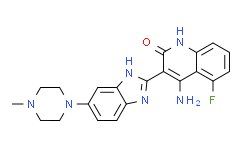| Description: |
Dovitinib is a multi-targeted tyrosine kinase inhibitor with IC50s of 1, 2, 8/9, 10/13/8, 27/210 nM for FLT3, c-Kit, FGFR1/3, VEGFR1/2/3 and PDGFRα/β, respectively. |
| In Vivo: |
Dovitinib (10 mg/kg, 30 mg/kg, 60 mg/kg, p.o.) shows significant antitumor effect in the KMS11-bearing mice model, and the growth inhibition is 48%, 78.5%, and 94% in the 10 mg/kg, 30 mg/kg, and 60 mg/kg treatment arms, respectively, compared with the placebo-treated mice[1]. Dovitinib (50 and 75 mg/kg) results in 97% and 98% tumor growth inhibition, respectively, and the maximal efficacy is at 50 mg/kg[2]. |
| In Vitro: |
Dovitinib potently inhibits the FGF-stimulated growth of WT and F384L-FGFR3-expressing B9 cells with IC50 values of 25 nM. B9-MINV cells are resistant to the inhibitory activity of Dovitinib at concentrations up to 1 μM. Dovitinib inhibits cell proliferation of KMS11 (FGFR3-Y373C), OPM2 (FGFR3-K650E), and KMS18 (FGFR3-G384D) cells with IC50 of values of 90 nM (KMS11 and OPM2) and 550 nM, respectively[1]. Dovitinib significantly reduces the basal phosphorylation levels of FGFR-1, FGFR substrate 2α (FRS2-α) and ERK1/2 but not Akt in both SK-HEP1 and 21-0208 cells[2]. Dovitinib enhances the BMP-2-induced alkaline phosphatase (ALP) induction, which is a representative marker of osteoblast differentiation. Dovitinib also stimulates the translocation of phosphorylated Smad1/5/8 into the nucleus and phosphorylation of mitogen-activated protein kinases, including ERK1/2 and p38[3]. Dovitinib strongly inhibits both the interaction of TNIK with ATP (Ki, 13 nM) and the activation of Wnt signaling effectors such as β-catenin and TCF4. Dovitinib also induces caspase-dependent apoptosis in IM-9 cells without significant cytotoxicity in PBMCs[4]. |






















